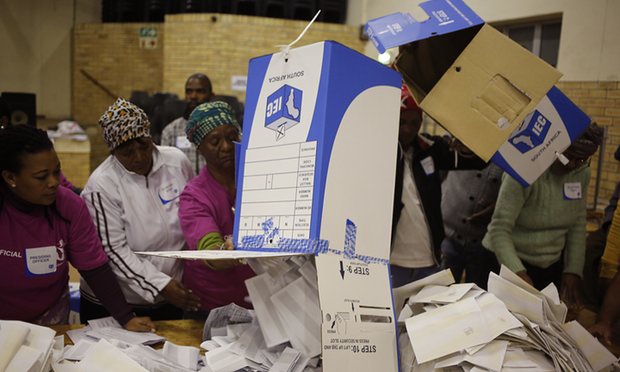PBS: Escaping Eritrea … [Read More...] about ካብ ውሽጢ ቤት ማእሰርታት ኤርትራ
Agencies in Johannesburg |
"We don't take sides; we help you see more sides."

Published:
PBS: Escaping Eritrea … [Read More...] about ካብ ውሽጢ ቤት ማእሰርታት ኤርትራ
Agencies in Johannesburg |

Results from South Africa’s fiercely contested local elections could deliver a setback to the African National Congress (ANC), with early indications on Thursday showing support for the party that ended apartheid falling below 60% for the first time and leaving it at risk of losing key cities.
With the count well under way, early results put the ANC ahead nationwide but looking at its worst performance since it first participated in elections in the 1990s.
The main opposition Democratic Alliance (DA) was on course to hold Cape Town and was inching ahead in the capital Pretoria, Johannesburg and Port Elizabeth, where the DA was leading in the Nelson Mandela municipality with 60% of the vote counted.
Opinion polls had placed the ANC and DA in a close battle for the key cities.
“I just voted DA for change,” said Claire King, 30, in Port Elizabeth’s central business district. “I just think we now need change in our country. Let’s give the DA a chance and see what happens.”
With over half of the vote counted, the ANC had 52% support nationwide, with the DA on 29% and the radical leftist Economic Freedom Fighters (EFF) on 7%, according to official results.
The ANC has never won less than 60% of the vote since the country’s first multiracial vote in 1994, when Mandela was sworn in as president.
The count is seen as a marker before the next general election, due in 2019, and also a midterm verdict on the president, Jacob Zuma, who has been plagued by economic woes and a series of scandals since taking office in 2009.
The ANC has dominated the political landscape since the fall of white-minority rule, but a faltering economy, rampant corruption and soaring unemployment have eaten into the party’s popularity.
Millions of voters braved winter cold to queue outside polling stations on Wednesday after a fiercely fought and occasionally bitter campaign marked by disputes over alleged racial slurs.
Both the ANC and DA may be forced to court smaller parties and independent candidates to cobble together outright municipal majorities. Even if the ANC maintains its hold on local power through party alliances, any overall drop in support would be a loss.
“Simply to form a coalition in Pretoria, the capital, would be an embarrassment,” the independent analyst Daniel Silke told Agence France-Presse.
The ANC won an overall 62% of the vote in the last municipal elections in 2011, while the DA took 24%.
A record 26.3 million people registered to choose mayors and other local representatives responsible for hot-button issues including water, sanitation and power supplies.
Zuma survived an impeachment vote in April after the country’s constitutional court said he had breached the law by ignoring an order to repay some of the $16m in state funds spent on renovating his private home.
In December, he rattled investors after changing his finance minister twice in a week, sending the rand plummeting. The currency has since recovered.
Zuma has said he will repay some of the funds spent on his home and rejected criticism of his conduct, but anger is rising in a country on the brink of recession.
Analysts also predict a downgrade by credit ratings agencies to “junk” status.
“A very weak outcome for the ANC, getting less than a 55% national vote share and losing three metros, would likely be viewed as a market positive,” said the Nomura emerging market analyst Peter Attard Montalto.
Agence France-Presse and Reuters contributed to this report